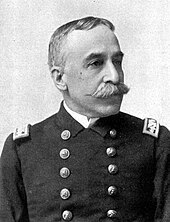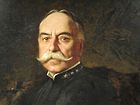George Dewey
George Dewey (born December 26, 1837 in Montpelier , Vermont , † January 16, 1917 in Washington, DC ) was an Admiral in the US Navy and the only holder of the highest rank of Admiral of the Navy .
biography
family
Dewey was born in Montpelier, directly across from the Vermont State House , to the doctor Julius Yemans Dewey and his first wife Mary Perrin. The father was one of the founders of the National Life Insurance Company in 1848, was a member of the Episcopal Church of the United States of America and was one of the founders of the Episcopal Church in Montpelier.
George Dewey had two older brothers and a younger sister. He attended Sunday school in Montpelier. He then attended school in the nearby town of Johnson.
In 1867 he married Susan ("Susie") Boardman Goodwin (1844–1872), daughter of New Hampshire Governor Ichabod Goodwin , and in 1899 the second marriage to the Catholic Mildred McLean Hazen.
Military career
Dewey attended the Norwich Military School in Norwich, Vermont from 1852 to 1854 and the United States Naval Academy in Annapolis , Maryland from 1854 to 1858 .
He fought in the civil war from 1861 under Admiral Farragut on the side of the northern states as a lieutenant at sea . He took part in the fighting in Louisiana and the Mississippi River . In 1865 he was Lieutenant Commander ( Corvette Captain ).
In 1872 he was promoted to commander ( frigate captain ), in 1884 to captain ( sea captain ) and in 1896 to commodore . Shortly before the outbreak of the Spanish-American War (1898), Dewey was transferred to the Pacific as commander of the US Asia Squadron .
Battle of Manila Bay
On April 27, 1898, Commodore Dewey departed from China on the flagship USS Olympia with orders to attack the Spaniards at Cavite in Manila Bay . He reached the entrance to the bay on the night of April 30th and attacked at dawn the following day. He managed to take out the entire Spanish Pacific fleet under Captain General (Admiral) Patricio Montojo y Pasarón within six hours and to silence the gun batteries of Manila without losing a single sailor.
This news made him a hero in the United States. It was founded in 1898 to Rear Admiral ( Rear Admiral ) in 1899 and skipping the rank of Vice Admiral to Admiral promoted. His victory moved the William McKinley administration to bring the Philippines under American control. In October 1899, President McKinley bestowed him a special saber of honor in a ceremony at the Capitol .
further activities
In 1900 Dewey became a member of the Schurman Commission , which worked out proposals for a civil government in the Philippines. Dewey returned to the United States as a hero and was the next runner-up for President, but he chose to support McKinley's re-election. In 1901 he was elected an honorary member of the New York Cincinnati Society.
Dewey was named Admiral of the Navy by the United States Congress in 1903, with retroactive effect from March 2, 1899 . He is the only person who has ever been awarded this rank. The rank is unofficially synonymous with that of a six-star general , in fact the rank only has seniority compared to the later introduced Fleet Admiral . He therefore remained an officially active officer until his death, which is a special tribute. He died in Washington, DC in 1917 and was buried in the Bethlehem Chapel of Washington National Cathedral .
honors and awards
Honors
- Three United States Navy ships have been named USS Dewey , including an Arleigh Burke-class destroyer , the USS Dewey (DDG-105) , which entered service in 2010.
- Dewey County , Oklahoma
- Dewey Lake in St. Louis County , Minnesota
- Dewey Point in Yosemite National Park , California , 1907
- Dewey City, satellite town in Thomasville, Georgia that was colonized by former slaves in the late 1880s.
- Deweyville in Newton County , Texas , 1898
- Monument to Dewey's Victory in Manila Bay in Union Square , San Francisco
- Several buildings and areas such as u. a. Dewey Hall in Annapolis, Maryland and Dewey Field in Newport , Rhode Island
- Several streets and squares like u. a. in St. Paul , Minnesota
- Dewey Beach in Delaware
- Dewey Fire Company No. 1 in Hellertown, Pennsylvania , 1898
- In the historical ranking of the highest officers in the United States , he is ranked third after George Washington and John J. Pershing .
Awards (selection)
- Battle of Manila Bay Medal
- Spanish Campaign Medal
- Civil War Campaign Medal
- Philippine Campaign Medal
Works
- Dewey, George: Autobiography of George Dewey (Annapolis: Naval Institute Press, 1987, originally published in 1913 by Charles Scribner's Sons, New York) ISBN 0-87021-028-9
literature
- Ronald H. Spector : Admiral of the New Empire: The Life and Career of George Dewey. - Baton Rouge: Louisiana State University Press, 1974
Web links
| personal data | |
|---|---|
| SURNAME | Dewey, George |
| BRIEF DESCRIPTION | American admiral |
| DATE OF BIRTH | December 26, 1837 |
| PLACE OF BIRTH | Montpelier (Vermont) |
| DATE OF DEATH | January 16, 1917 |
| Place of death | Washington, DC |



